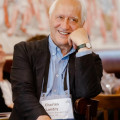Collection Editors

Anke Gruendel
Anke Gruendel is Academic Coordinator Leuphana Transformation Lab at Leuphana University of Lüneburg and part of the international research collective Governing Through Design.
She holds a MA in Design Studies from Parsons, The New School for Design and a PhD in Politics from the New School for Social Research. Her research interests include technopolitics, political and technical infrastructures, modern forms of political rationality, as well as theories of democracy and the political.
In her current research, she focuses on public sector design in modern technical democracies in which governing and planning has become a site for critical inquiry. She investigates the participatory dimensions of design as a material enactment of democratic norms in which lived experience and situated knowledge is part of a new political epistemology. With a particular emphasis on understanding the conditions of possibility for the political relevance of embodied design practices as forms of material participation, she seeks to understand how government today is beginning to draw on a global network of public sector innovation that aims to radically transform how public policies and services are formulated and implemented.
Through the diverse practices and discourses of public sector innovation, she is interested in developing a broader perspective on how democracy continues to become reconfigured in relation to ostensibly technical questions.

Charles Landry
Charles Landry is a prominent figure in city development and innovation. Best known for "The Creative City: A Toolkit for Urban Innovators." And followed by “The Art of City Making”. These revolutionized how we approach city planning and management. His extensive work reimagines city-making by exploring the nomadic world, intercultural cities, cultural resources and creative economy the psychology of urban spaces, risk and fragility, creative bureaucracies, and the measurement of creativity. His career has focused on how to harness the collective imagination and intelligence and to rethink, replan and act differently. He established Comedia, a think tank, publisher, and consultancy in 1978. He has worked all around the world and in 2018 he co-founded the Creative Bureaucracy Festival in Berlin.